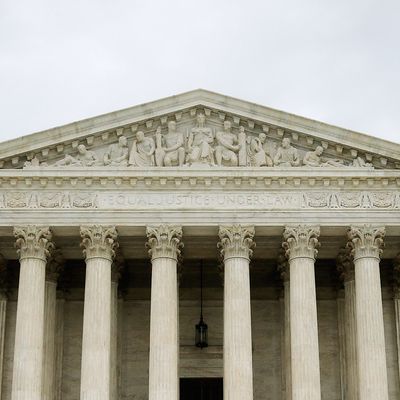
Federal appeals courts handed down a mixed bag for the Affordable Care Act on Tuesday, with two panels delivering opposing rulings on how broadly to read Obamacare’s section on tax credits. The judges are divided, like the rest of the country. The Supreme Court could be next. Again.
In D.C., two Republican-appointed judges won out against their colleagues to find that subsidies are available only for insurance plans acquired “through an Exchange established by the State under section 1311 of the [ACA].” This wouldn’t be a huge blow to the health-care law had 36 states not failed at setting up their own exchanges. (Some refused outright; others, like Oregon, will begin using the federal exchange in November after facing repeated website disasters.) As a result, most Americans are faced with purchasing insurance in the federal marketplace, many with subsidies meant to make insurance plans more affordable.
But a few hours later, a 4th Circuit panel of Democratic appointees ruled in favor of an expansive interpretation of the subsidies, saying that expanding them to include the federal exchange is a “permissible exercise” of the IRS’s discretion.
The root of the conflict lies in a section of the Affordable Care Act that authorizes tax subsidies for insurance buyers who make up to four times the poverty rate. Those subsidies are supposed to make purchasing individual health insurance more affordable for average Americans, but also enabled the government to put penalties into place for people who choose not to get covered.
Yet going by the letter of the law, the subsidies are only for insurance purchased on state exchanges, and that’s indicated several times in the ACA. The IRS, instead, decided to go with the spirit of the law, broadly reading other sections to allow tax subsidies for people who are forced to shop on the federal exchange as well.
After the first ruling, House speaker John Boehner didn’t hesitate to claim that this shows the ACA is “completely unworkable,” while White House spokesperson Josh Earnest said that subsidies would continue as planned while the administration requested a hearing from the full 11-member D.C. court. The Obama administration’s chances would likely be better with the full panel deciding since just four of them are Republican appointees, and four were appointed by Obama himself. If the partisan split continued to hold, a reversal wouldn’t be too far away.
But with two conflicting Circuit Court decisions, the question over subsidies will likely head straight to the Supreme Court for a final ruling. (“If there is a split in the circuits, then I think the Supreme Court would have to step in,” said Elizabeth Wydra, chief counsel for the Constitutional Accountability Center.) And should the D.C. Circuit’s interpretation win out, it’s unclear what would happen to those who have already purchased insurance using government subsidies. In a worst-case scenario, they may have to pay back the tax credits that enabled them to purchase insurance in the first place.





























